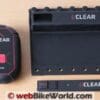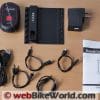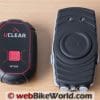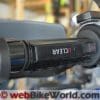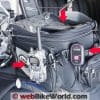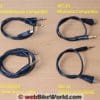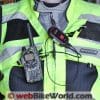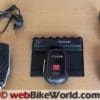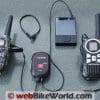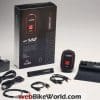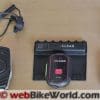An excellent universal Bluetooth audio adapter, the UClear WT300 “Spider” streams stereo sound from any connected device.
It also connects a two-way radio with your motorcycle Bluetooth intercom system.
The WT300 kit comes with a wireless Push-to-Talk (PTT) controller that can be attached to the handlebar or elsewhere.
The WT300 is compatible with all motorcycle Bluetooth intercom systems.
Advanced communications mode features and a stereo music streaming mode that works with compatible headsets distinguish the WT300 Spider from the Sena SR10 (review).
The UClear WT300 focuses on two-way radio communications as the priority, but still allows mobile phone monitoring.
The WT300 firmware can not be updated with the current version of the hardware, unfortunately.
But UClear has packaged what is arguably the best helmet audio and audio processing capabilities available in the UClear HBC100 (review).
And if the very capable WT300 can be “tweaked” to support more advanced features (e.g., dual-streaming), then it would be one tough product to beat.
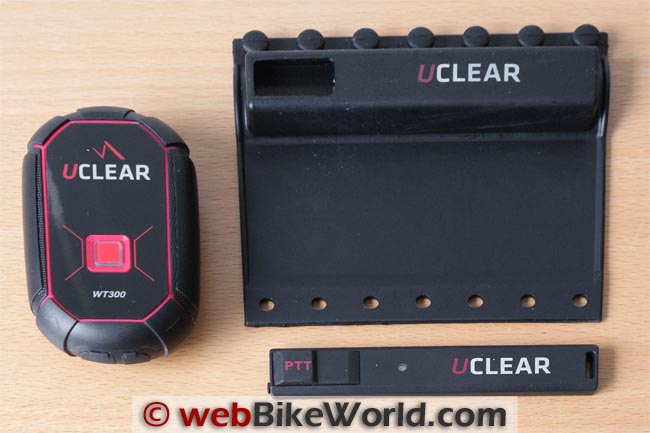
What Is It?
The WT300 connects with a non-Bluetooth device via the included cable and it streams the output from those devices to a Bluetooth intercom headset.
Non-Bluetooth devices that can be “converted” include electronic gear like a FRS/GMRS “Walkie-Talkie” two-way radio; an MP3 or iPod music player; a radar detector; GPS and others.
The WT300 includes a wireless Push-to-Talk (PTT) remote control that can be attached to the motorcycle handlebar or other locations. It controls the two-way radio channel.
The WT300 will pair with any Bluetooth speaker or intercom headset to create a hands-free wireless communication system.
The Editor got a first look at the UClear WT300 “Spider” Bluetooth adapter during the 2012 Powersports Dealer Expo (report) and the UClear WT300 “Spider” Bluetooth Adapter Previewprovided a sneak peek into what parent company BITwave was preparing to release.
As a Bluetooth adapter, the WT300 is similar in overall function to the Sena SR10 (review).
The UClear WT300 reflects the company’s experience, reputation and desire to do things a bit differently; typically not a bad thing if said experience is leveraged properly.
And speaking of experience and reputation, readers will know how impressed we were and remain with the original UClear HBC100 (review) system.
Its only shortfall (literally) being a self-imposed range limitation with the use of Class 2 power output rather than the higher Class 1 output utilized by longer-range capable systems.
I regularly use the HBC 100 and newer HBC 120 “Snow” systems and for noisy riding environments, the UClear devices just plain out-perform the competition.
The release of the WT300 + PTT system provides a communications enhancement for UClear (and other) motorcycle intercom systems by adding two-way radio support for multi-rider (unlimited) use with increased communication ranges.
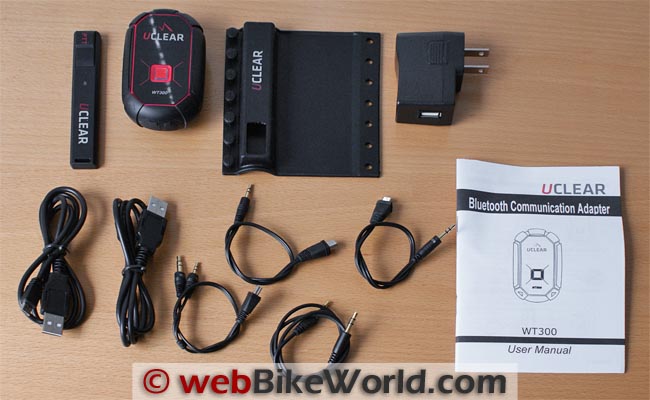
In the UClear W300 Kit
Anxiously awaited, especially after the Editor’s preview, I was starting to wonder when the UClear retail release was going to happen.
But as Spring sprung, two of the WT300 kits were received and after the usual stock photos were completed, forwarded into my eager hands for this webBikeWorld review.
- Each UClear WT300 Spider retail box contains the following:
- WT300 Bluetooth adapter hub (weighing in at a featherweight 60 g (2.1 oz.).
- Wireless PTT (Push-to-Talk) remote control.
- AC/DC charger module with USB jack.
- One mini and one micro-USB charging/data cables for WT300 and PTT respectively.
- Three two-way radio connection cables, each 25 cm long (9.8 in.).
- One 3.5 mm stereo cable (3-pole plugs), 53 cm in length (20.8 in.).
- PTT handlebar mount (stretch-wraparound).
- User manual (recently updated).
WT300 + PTT System Details
Like the Sena SR10 Bluetooth adapter (review), the UClear WT300 + PTT Spider has a separate switching module or hub, along with an external Push-to-Talk (PTT) component.
But UClear takes it to the next level in providing a wireless PTT module that works seamlessly with the WT300.
Both components run Bluetooth v2.1 +EDR with the WT300 utilizing the (Audio Gateway) hands-free, intercom and advanced audio distribution profiles along with the UCLEAR WT300 Walkie-Talkie interface and the Radio Frequency Communication (RFCOMM) protocol.
The PTT remote utilizes the RFCOMM protocol.
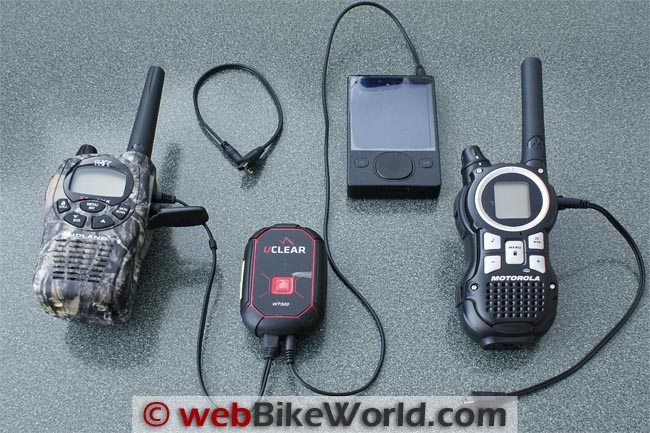
WT300 Bluetooth Adapter
Compared to the larger Sena SR10, the smaller WT300 Bluetooth adapter is easier to carry and stow with a simple fixed belt-style clip for mounting or wearing.
It can be packaged in a small form factor anyway, as it has fewer ports to accommodate.
Where the Sena SR10 has five ports (PTT, two-way radio interface, two AUX and charging/data), the WT300 makes do with two: a mini-USB port for charging and the two-way radio interface and a single 3.5 mm auxiliary jack for connecting non-Bluetooth devices.
The non-Bluetooth devices that can be connected include mobile phones, radar detectors, GPS or portable music players.
The only other interface point on the WT300 is a small recessed button found on the bottom side that provides an instant reset function.
Music Streaming Mode utilizes A2DP to serve up stereo steaming between the WT300 and a (compatible) paired Bluetooth headset.
In comparison to the current Sena SR10 that interfaces via a single channel (mono) audio stream even if a stereo output peripheral is connected.
The WT300 is optimized for use with the headset from a UClear motorcycle intercom system.
It provides the advantages of the advanced communication mode, allowing the UClear-brand headset to be paired with a Bluetooth mobile phone, the WT300, and another UClear headset for intercom use.
When using the WT300 with a non-UClear brand intercom headset, however, there is a clear limitation.
Either a mobile phone or the WT300 can be paired at one time, and if the WT300 is paired, switching between two-way radio mode and A2DP mode requires re-initialization as mentioned earlier.
Ffor Sena intercom users, the Selective Profile pairing feature available with the Sena version 4.0+ firmware can provide an alternative; use A2DP for the smart phone and HFP for the WTT300 connection — it works.
Note: As identified in the Sena SMH10B Version 4.0 Software Update, if a smart phone is paired to the SMH10B using the Selective Profile process for A2DP functionality only, the two-way radio mode of the WT300 can still be enabled.
It will be paired to the SMH10B using the hands-free profile.
If the PTT is pushed, the stereo music stream from the phone will be paused and the two-way radio link activated.
Once the two-wary radio session is completed, the music stream resumes in 25 to 30 seconds.
I’ve even had the phone feature work in this configuration, but only if the PTT has not been used for a minute or so, which seemingly releases the hands-free profile for use by the phone…but your results may vary from mine.
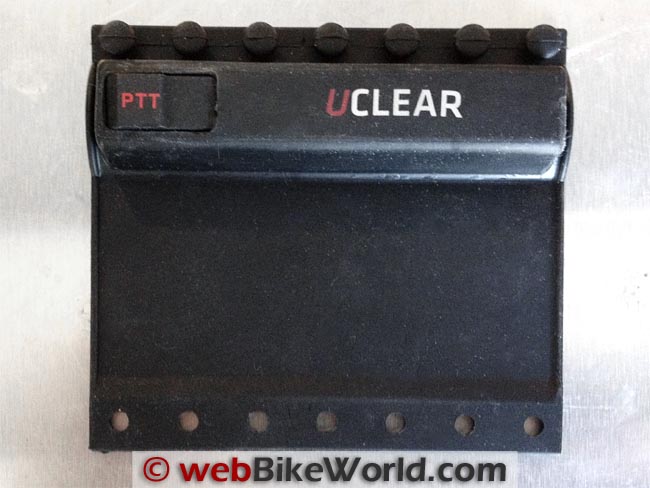
PTT Remote (Control)
Thin and very light, the wireless Push-to-Talk device that comes with the WT300 is snow- and rain-resistant and it operates with a nominal range of 10 meters (Class 2) with the WT300 adapter.
It has one control, the PTT button, one LED for visual communication, and one port — a mini-USB jack on one end discretely covered with a compressible flush-mounted rubber weather cap.
The PTT module has an eyelet on one end so it can be safety-wired or have a short loop put through it for use with a neck strap or something similar.
A stretchable rubber grip with an insert sleeve for the PTT remote provides an expedient means to mount the remote on the left handlebar, secured in place by seven rubber “buttons”.
UClear WT300 System Function and Management
Along with the important Push-to-Talk functionality, the WT300 connects other non-Bluetooth devices for audio use, where it acts as a multi-faceted Bluetooth Adapter or dongle.
Modes: Depending on the last previously paired or utilized peripheral the WT300 starts in one of three modes:
- The advanced communications mode (ACM) that exists when paired with UClear headsets;
- the Hands-Free Profile communication mode;
- or the A2DP music streaming mode.
Re-initialization/re-pairing is needed to change the operational mode.
Power On/Off: Press and hold the multi-function button for two seconds and the LED flashes blue and then settles into a once-every-two seconds cycle in “idle” mode.
Pressing the multi-function button for five to six seconds will result in five red flashes from the LED before the device turns off.
The system also shuts off after one hour if no connection exists to a headset; a useful battery conservation effort, but this feature needs to be remembered when you’re using the WT300 while riding.
Connection/Disconnection: Connecting or disconnecting a UClear headset from the WT300 is done by pressing the down button on the headset for two seconds.
The WT300 will also disconnect if either the intercom or mobile phone features of the headset are activated.
Battery Life: UClear claims up to 20 hours of music and talk time and that fact cannot be argued, as I typically get two to three days of pretty constant use before getting or seeing the low-battery alarm (the LED blinks a three-pulse set every three seconds).
The audible alarm is a four beep tone set at one minute intervals in the headset.
Reset: An instant shutdown of the device is available by pressing the reset button on the back. I’ve never had to use this, except on purpose for a test activity.
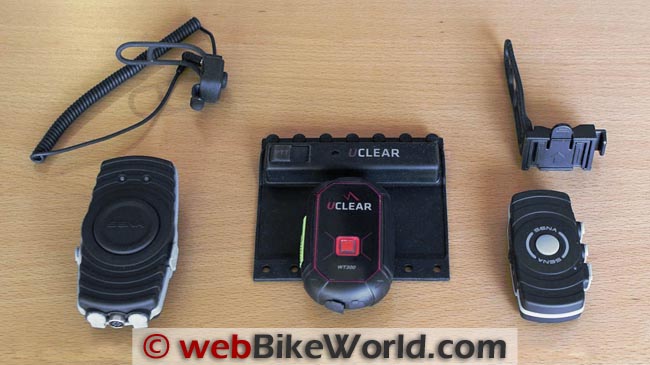
Activating the WT300 and PTT Remote
The WT300 hub and the PTT supplied in each WT300 kit are already factory paired and should not have to be paired again (but can be if necessary).
A press on the PTT button wakes the device up and initiates a link call to the paired WT300. The LED on the PTT device blinks a rapid blue during this activity. Once a link is established, the LED goes out.
Another push on the button initiates a communications session via two-way radio, which is indicated by the usual beep tones and/or white noise in the headset.
The LED on the PTT remote stays solid blue during use.
Pairing and Use with UClear Headsets
Significant advantages are claimed when a UClear intercom system, such as the UClear HBC100 (review) or other UClear intercoms are connected with the WT300 + PTT device.
These enhancements are grouped under what UClear identifies as the Advanced Communication Mode (ACM).
This provides two-way radio support, an additional means to activate PTT (from the headset) and the ability to connect the headset to a mobile phone and another UClear headset for intercom use at the same time.
Establishing the necessary pairings to exploit all of these features isn’t fully detailed in the HBC manuals.
But everything is well covered in the WT300 user manual, recently updated to correct some procedural errors. The updated manual is available for download here.
Pairing and Use with Non-UClear Headsets
The WT300 + PTT system works just fine with other motorcycle Bluetooth intercom systems.
But there are minor variances in the setup procedures and capabilities may be limited (to a degree) when compared to the functionality provided when connecting to a UClear intercom.
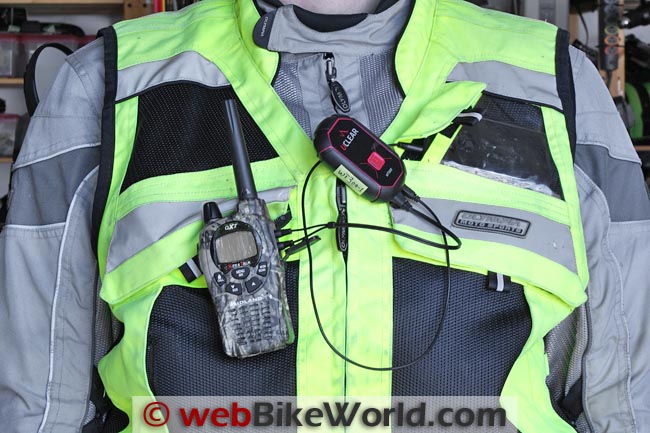
Two-Way Radio Use
Three two-way 25 cm long radio interface cables are supplied in the WT300 kit.
These include a WC-10 (Motorola compatible), single 2.5 mm 3-pole pin and a WC-11 (Uniden compatible), single pin 2.5 mm 3-pole pin.
Also includes are WC-12 (Motorola and Midland compatible), 2.5 mm and 3.5 mm pins, both 3-pole.
The WC-10 cable works perfectly with the Motorola Talkabout MR350 (review) I have on hand.
Separate 2.5 mm and 3.5 mm connectors on leads eliminates the fixed dual-pin wide VS narrow spacing issue, presuming the pin assignments are correct, that is.
To connect the WT300 and PTT device to the two-way radio, choose the correct cable for the radio to be used and connect the two-way radio to the adapter’s mini-USB port.
With the radio turned on, set the volume to mid-range as a starting point; fine-tuning the radio configuration is best done with volumes set to mid-point or lower.
While receiving a radio transmission, increase and decrease the volume of the radio to determine optimal discrimination settings between voice and noise. Do not adjust headset volume during this initial discovery activity.
To activate the PTT remote with the WT300 and two-way radio, with all three devices “connected” and turned on, press and hold the PTT button on the remote.
Its indicator will turn a solid blue and the WT300 LED will turn red while a two-way radio session is active.
UClear Headset Activation
One of the identified features of the advanced communications mode is the ability to use the “answer” button of the headset as the PTT switch; press to transmit and release to go to “receive” or to end the session.
As long as the headset and adapter are connected, this feature works as an alternative to the PTT remote, albeit taking more effort and with the hand off the bars.
Pressing both the up and down volume buttons on the headset simultaneously will enable or disable VOX in the UClear headset.
Speak loudly into the helmet to trigger the feature, opening a two-way radio link indicated by the red LED on the WT300.
Two seconds of silence switches the system back to “receive”.
Note: Make sure VOX mode/settings are turned off on the two-way radios are in use before utilizing this UClear-to-UClear feature.
Non-UClear intercom headset VOX activation is available with non-UClear headset configurations, but the Multi-Function Button on the WT300 is used to activate VOX rather than the up and down buttons of a UClear brand headset.
Pressing the MFB three times enables or disables the feature. When enabled, a beep tone indicates VOX is active.
Talking loudly triggers the feature and opens a radio link. Note that using this activation feature disables the PTT on the remote.
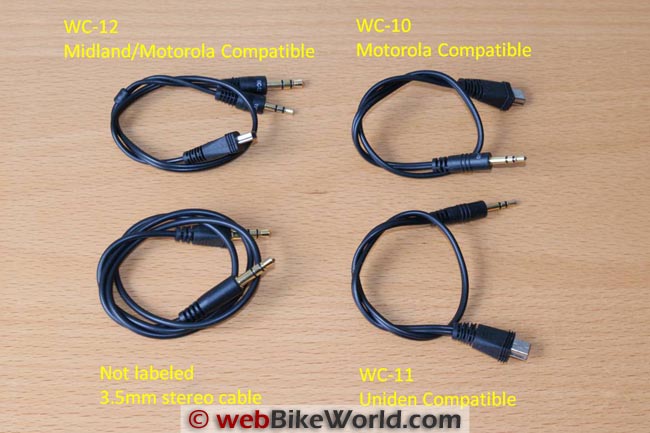
UClear WT300 Music Streaming Mode
The WT300 supports wired peripherals only, as compared to the Sena SR10, which supports both wireless and wired connections.
This may be a possible disadvantage with some configurations, but the WT300 features stereo music streaming and the SR10 does not.
This, at least from my perspective, is a good tradeoff.
Pairing a UClear or other brand of intercom headset for stereo streaming is pretty simple and the resultant stereo stream clearly separates the UClear adapter from the Sena adapter.
With the WT300 powered on, follow the corrected procedure in the revised manual, including the shut-down and restart steps.
Every motorcycle and personal Bluetooth intercom headset I have tried has paired up on the first pass with the WT300 using the process detailed in the owner’s manual. Only one system balked, and that was cured by a new pairing.
Another had some buffering issues, which were cured by pushing the WT300’s MFB once to initiate a re-sync to restore the stream; this is the solution for restoring a lost link as well.
Using a UClear headset allows the link and streaming to be restored by pushing either the MFB on the WT300 or with one or two pushes on the “phone” button of the headset.
This is not documented per se, but it works consistently, at least for the two systems I have on hand here.
AUX Inputs
Everything connected to the WT300 via the 3.5 mm jack, including three navigation devices and multiple music players all worked fine.
Voice navigation and audio alerts from devices can be heard while using the two-way radio; the audio streams are mixed into one and streamed between the WT300 and a headset in the same manner used by the Sena SR10.
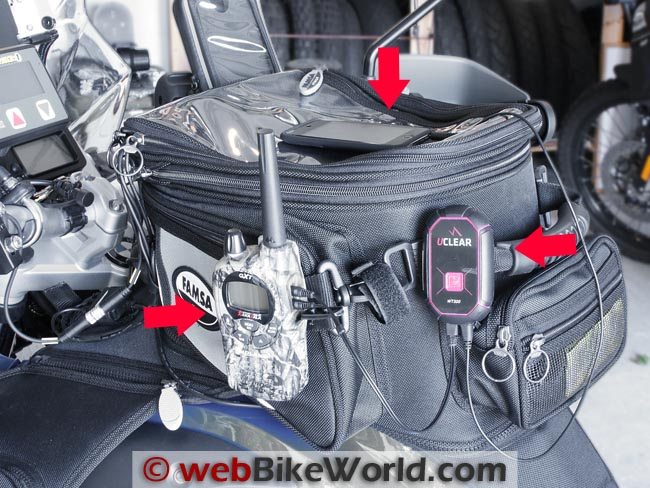


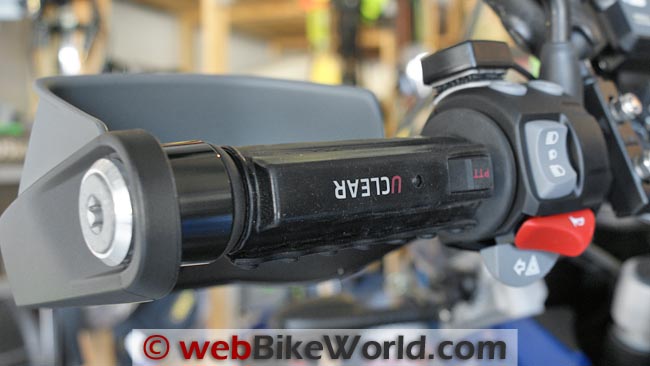


Installation
The small size of the WT300 and its clip mount make carrying or stashing the WT300 module almost anywhere within reason a breeze.
Only the short interface cables limit options — all of them are far too short for many uses; twice as long would be better.
The ultra-pliable wraparound sleeve for the PTT remote is functional but puzzling to a degree. It holds the PTT discretely and securely and with some effort it can be mounted to any left handlebar grip (unless very thick grips are in use).
But as mounted for left-hand thumb use, the sleeve and PTT look like they were designed and labeled for use on the throttle side!
When the sleeve is buttoned up on the left grip, an initial test ride is recommended so that the least intrusive positioning of the sleeve can be determined while still maintaining easy access to the PTT button.
The sleeve buttons and resulting overlap can be less than comfortable depending on hand size, gloves being worn and hand placement.
I have mine rotated down so the PTT is almost on the underneath of the grip; given the shape and placement of my hand, the “button” strip is less obtrusive and the PTT easily accessed by my thumb. But still, after extended time in the saddle, the fixture will be felt.
A more comfortable workaround was implemented by removing the PTT remote from its sleeve and securing it directly to the hand grip with two thin fastener straps; less obtrusive and very secure, albeit out of its enveloping cocoon.
I really like the wireless approach and the PTT remote is utterly flawless in operation, but I was thinking that a small module housing the needed components could be stuck to the left control housing or mirror with a short lead connecting a small button-style PTT strapped to the grip — more complicated, but a possible option.
And on a really picky point, while the small blue LED on the PTT is a good visual signal that the device is awake and linked to the WT300, the LED is covered when in the sleeve.
If desired, a small viewing window carefully created by removing some of the rubber at the appropriate spot allows the LED to be seen, depending on orientation of course.
On the Road Use & Observations
My on-road performance rating for the UClear WT300 is excellent. It would be an “outstanding” if the mode initialization steps weren’t needed.
While not directly impacting performance per se, mounting, stowing or carrying the essential components is hampered by the restrictive cable lengths requiring the WTT and connected devices to be mounted or carried in close proximity to each other.
This is not always the best solution, particularly when a two-way radio transmitter is a key component.
When dismounted for whatever reason, functionality of the system is provided as long as needed components are carried on the person, with PTT functionality provided by the “phone” button on UClear headsets or by activating VOX feature.
And speaking of two-way radio use, once connected and tested, this capability is seamless — PTT switching seems instantaneous with no loss of the crisp clear audio coming through the headset speakers.
In VOX mode, a single word to activate the circuitry does the trick, again without any missed speech.
Like the Sena SR10, the UClear WT300 systems can be carried (I use small clear plastic food containers at $1.25 CAD each) and brought into use at any time, with any headset system (see Compatibility list below), as long as a connectable two-way radio is carried as well (always).
This is real versatility with overall outstanding performance and reliability.
Battery life is outstanding and even after sitting for two weeks it took less than ten minutes for the LED to turn Blue indicating full charge.
Power consumption is miserly; two to three full days of use is typical, with a one to two hour AC recharge bringing the battery back to full (slightly longer when trickle-charged via USB power).
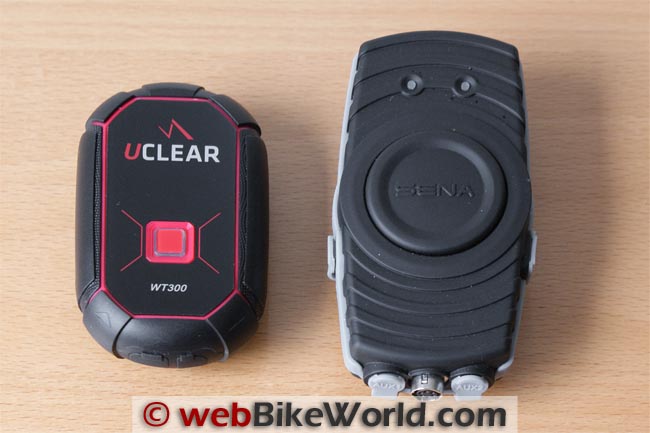


Compatibility
So far the following Bluetooth systems and headsets have successfully paired with the WT300 for mode functions, including stereo streaming (many of these configurations have been described previously in related webBikeWorld reviews):
- UClear HBC100 (review) and HBC 120 Snow.
- Sena SMH10B (review), version 4.1 firmware.
- Cardo Scala Rider G4 (review), version 3.0 firmware.
- Cardo Scala Rider G9 (review), version 1.1 firmware.
- Midland BT NeXt Intercom (review), version 07.3.2012 firmware.
- BikeComm Hola S-10 and F-10 (review), version 1.89 and 1.92 firmware respectively.
- SCHUBERTH SRCS (review), version 3.0 firmware.
- RocketFish RF-MAB2 personal headset and the wiRevo (review) S300 personal headset.
Like the Sena SR10 was when initially released, the UClear WT300 is another step forward and for many consumers it is a great and cost effective solution.
Now we just need to see if UClear will step up to the plate and challenge the Sena SM10 device in some way, either by enhancing the WT300 Spider or by developing a new device. Either way, the consumer wins.
Conclusion
Outside of its single-mode-at-a-time use and short connection cables, there isn’t much else to nitpick regarding the UClear WT300 Bluetooth adapter.
It works exactly as claimed and its stereo streaming mode is really a high point.
Even with the Sena SR10 Bluetooth hub and now the release of the Sena SM10 Bluetooth Stereo Adapter, the UClear WT300 remains a strong presence in this relatively small sub-set of the Bluetooth market segment.
UPDATE (April 2, 2014): UClear confirmed that the WT300 will be discontinued.
| webBikeWorld Overall Opinionator – UClear WT300 Bluetooth Adapter | |
|---|---|
| Picks… | ….and Pans |
|
|
| wBW Review: UClear WT300 Bluetooth Adapter + PTT | |
|---|---|
| Manufacturer: BITwave / UClear Digital | List Price: $199.95 |
| Colors: Black. | Made In: China |
| Size: N/A | Review Date: July 2012 |
Note: Item provided by a retailer, distributor or manufacturer with these Terms and Conditions.
Owner Comments and Feedback
See details on submitting comments.
From “D.T.” (September 2012): “I think the PTT controller is designed to have the button on the front of the left handle bar so you can push it with an index finger. The writing is upright then and thinking about the way I hold/rest my hand on the handlebar, seems to me to be less intrusive as well.”
H.B.C.’s Reply: Tried it in this position (reflected in the article somewhere, or should have been), but again, it all depends on what type of handlebars you have, the type of grips and most important, the size and positioning of the hand.
Many of us keep one or two fingers over the levers (track tricks and expediency of use), so the index is more important for pressure grip, etc…and for many hands, the index finger has limited mobility when wrapped around a handgrip (proven in studies).
For orientation purposes and using any PTT, the thumb is the preferred digit – it is used to access the left handlebar control module switches and buttons, it has the dexterity, strength and, doesn’t require any repositioning or stretching of the hand, in most cases.
But having said all this of course, it can be positioned and used in that orientation and for many, it will be a workable solution and as such, yes, it is a good tip for users to try.


